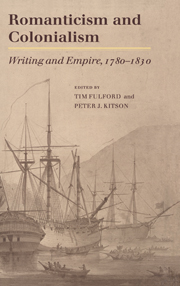Book contents
- Frontmatter
- Contents
- Notes on contributors
- Acknowledgements
- 1 Romanticism and colonialism: texts, contexts, issues
- 2 Romanticism and colonialism: races, places, peoples, 1785–1800
- 3 Romanticism and colonialism: races, places, peoples, 1800–1830
- 4 Accessing India: Orientalism, anti-‘Indianism’ and the rhetoric of Jones and Burke
- 5 ‘Sunshine and Shady Groves’: what Blake's ‘Little Black Boy’ learned from African writers
- 6 Blood Sugar
- 7 ‘Wisely forgetful’: Coleridge and the politics of Pantisocracy
- 8 Darkness visible? Race and representation in Bristol abolitionist poetry, 1770–1810
- 9 Fictional constructions of Liberated Africans: Mary Butt Sherwood
- 10 ‘Wandering through Eblis’; absorption and containment in Romantic exoticism
- 11 The Isle of Devils: The Jamaican journal of M. G. Lewis
- 12 Indian Jugglers: Hazlitt, Romantic Orientalism, and the difference of view
- 13 ‘Some samples of the finest Orientalism’: Byronic Philhellenism and proto-Zionism at the time of the Congress of Vienna
- 14 ‘Once did she hold the gorgeous East in fee…’: Byron's Venice and Oriental Empire
- 15 The plague of imperial desire: Montesquieu, Gibbon, Brougham, and Mary Shelley's The Last Man
- Index
12 - Indian Jugglers: Hazlitt, Romantic Orientalism, and the difference of view
Published online by Cambridge University Press: 20 August 2009
- Frontmatter
- Contents
- Notes on contributors
- Acknowledgements
- 1 Romanticism and colonialism: texts, contexts, issues
- 2 Romanticism and colonialism: races, places, peoples, 1785–1800
- 3 Romanticism and colonialism: races, places, peoples, 1800–1830
- 4 Accessing India: Orientalism, anti-‘Indianism’ and the rhetoric of Jones and Burke
- 5 ‘Sunshine and Shady Groves’: what Blake's ‘Little Black Boy’ learned from African writers
- 6 Blood Sugar
- 7 ‘Wisely forgetful’: Coleridge and the politics of Pantisocracy
- 8 Darkness visible? Race and representation in Bristol abolitionist poetry, 1770–1810
- 9 Fictional constructions of Liberated Africans: Mary Butt Sherwood
- 10 ‘Wandering through Eblis’; absorption and containment in Romantic exoticism
- 11 The Isle of Devils: The Jamaican journal of M. G. Lewis
- 12 Indian Jugglers: Hazlitt, Romantic Orientalism, and the difference of view
- 13 ‘Some samples of the finest Orientalism’: Byronic Philhellenism and proto-Zionism at the time of the Congress of Vienna
- 14 ‘Once did she hold the gorgeous East in fee…’: Byron's Venice and Oriental Empire
- 15 The plague of imperial desire: Montesquieu, Gibbon, Brougham, and Mary Shelley's The Last Man
- Index
Summary
It is seeing with the eyes of others, hearing with their ears, and pinning our faith on their understandings. The learned man prides himself in the knowledge of names, and dates, not of men or things. He thinks and cares nothing about his next-door neighbours, but he is deeply read in the tribes and casts of the Hindoos and Calmuc Tartars.
(Hazlitt: ‘On the Ignorance of the Learned’)Recent work on the relationship between early nineteenth-century Orientalism and Romantic literary texts has successfully challenged and extended Said's definition of a monolithic construction of ‘the Orient’ by deploying psychoanalytic models of interpretation and imperialism. By giving psychoanalysis the status of a metaphorical economy, critics, such as John Barrell and Nigel Leask, have been able to articulate and display the various forms of the imaginary, whilst maintaining a committed concern for an underlying material, social reality. By taking ‘anxiety’ as his startingpoint, Leask focuses on the instability within Romantic constructions of ‘the East’ and he is able to expose the variety of impulses within Romantic Orientalism which are simultaneously collusive with and critical of the hegemony of imperialism. The interrelationship between British culture and its construction of ‘the East’ mixes absorption and dominance with identification and differentiation so that, as others have pointed out, there is a profound ambivalence at the heart of the Orientalist imagination as a result of the subject's ‘inoculation’ and the enzymic nature of change taking place in the colonial culture.
- Type
- Chapter
- Information
- Romanticism and ColonialismWriting and Empire, 1780–1830, pp. 206 - 220Publisher: Cambridge University PressPrint publication year: 1998
- 1
- Cited by



